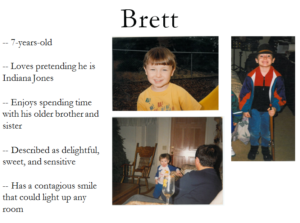 (November, 2013)
(November, 2013)
Yesterday, I had a group presentation in my psychology class about depression, bipolar disorder, and suicide. Each us had a different section and mine was depression. We agreed to pick real-life examples of people who struggle(d) with each of these things. At the beginning of our presentation, we had picture cards with a blurb of the person’s story on the back. We picked several people to get up in front of the class to show the picture and read the blurb to everyone.
My real-life example was about Brett.
An older man, Tom, agreed to read Brett’s story to the class. On the front of the card was this picture:
And on the back, Tom read this blurb to the class:
My name is Brett. I love superheroes, music, and my brother and sister. I am only 7-years-old when I start going through depression. My dad is a drug addict and an alcoholic, and he is verbally and emotionally abusive toward me. My mom tries to protect me, but she has to be away from the house during the day because she works to support our family. I am afraid to be alone in the house with my dad. I can’t force myself to smile or laugh. I spend most days hiding in my room, and eating to make myself feel better. I don’t believe that anyone truly loves me. I am not even sure that I am worth loving.
It was so touching because, during the middle, Tom got all choked up and he struggled to finish reading it. As he went to sit down, my professor said, “Wow. That must’ve been really hard to read.”
Later on in my presentation, I shared a bit more of Brett’s story with this slide:
This little boy is Brett and this is his story.
My name is Brett, and my beginning life as a child is happy. I like to spend my free time imagining I am Indiana Jones, and spending time with my older brother and sister. My mom describes me as being delightful. She says I am sweet and sensitive. She also says that I have the most contagious smile—one that could light up any room.
Around the time I turn 7, I begin to experience severe depression. My dad had become an alcoholic and a drug user. He was verbally abusive to me and my family. My mom had to work in order to support our family, so my siblings and I would have to be in the house with him alone. We never knew if we would do anything wrong to make him yell at us, so I spent most days hiding up in my room.
Several years later, my parents got a divorce, and my dad showed signs of coming around. He especially liked to spend time with my older brother and take him on fun adventures. He would plan fun adventures with me, and I would spend my afternoons by our front window, waiting for him to come pick me up. Most times, he would never show, and I would spend the rest of the day lying in my mom’s arms, crying, wondering why my dad didn’t love me.
This drove me deeper into the most painful sadness I had ever felt. I spent my afternoons either laying in my bed or standing at the front of house, staring out the window. I felt too tired and sad to move or do anything. Mostly, I tried to console myself by eating anything I could get my hands on. My siblings would get angry at me for eating everything in the house, but I didn’t care. I would do anything to keep the pain away.
After that, I went on my whole spiel about depression. But, my last slide was sharing the positive outcome of Brett’s story.
I started off by saying that Brett is actually my little brother, and the mouths of EVERYONE in the class dropped, especially Tom, the man who read Brett’s card. My professor smiled so big, clapped her hands, and said, “We love positive outcomes!” I told the class that Brett didn’t write this, but this is what I think he might say:
I am 21-years-old now, and I have not spoken to my dad in years. My family and I have healed a lot since cutting ties with him. We have learned to be open, honest, and kind with each other. I love them, and I know they love me.
When I was 14, my mom remarried a good man. He has taught me how to be a good man, too—how to take care of myself and the people around me. This has helped me to heal a lot. Currently, I am working a full-time job, writing a screenplay, and am the head drummer at my church. I still have struggles with depression, but talking about these with my family helps. I can feel myself healing more and more each day.
Not to toot my own horn, but I think it ended up being the heart of the presentation. My teacher actually came up to me after class, thanked me for sharing my brother’s story, and said that it was very powerful.
I just wanted to share because it made me realize that our testimonies and healing from pain is so inspirational to others. I think especially seeing that sweet little Brett face, hearing his heart-breaking story, and realizing how far he has come from that? Wow. Powerful.
And honestly, I believe that that is because of you, Mama and Doug. We could not have made it this far without the two of you. You have helped each of us to survive. You’ve given each of us room to heal. You’ve encouraged each of us to pursue our dreams. You’ve challenged us to look at our weaknesses, and pushed us to run toward our strengths. We talk about different types of therapy in our class, but I don’t think any amount of therapy could bring about the healing that the 4 of us have received because of the two of you.
I love you very much.
Charla

 “Transgression speaks to the ungodly within his heart; there is no fear of God before his eyes.”
“Transgression speaks to the ungodly within his heart; there is no fear of God before his eyes.” use to keep their victims living a life of emotional paralysis, 99% of them would probably apply to the man to whom I was married for 20 years. But as I read and hear other women’s stories, other more subtle patterns emerge, and among them is a practice I have struggled to identify even in my own history, a bizarre combination of passive and controlling abuse.
use to keep their victims living a life of emotional paralysis, 99% of them would probably apply to the man to whom I was married for 20 years. But as I read and hear other women’s stories, other more subtle patterns emerge, and among them is a practice I have struggled to identify even in my own history, a bizarre combination of passive and controlling abuse.  “For You have been a defense for the helpless, a defense for the needy in his distress, a refuge from the storm, a shade from the heat; For the breath of the ruthless is like a rain storm against a wall.” Isaiah 25:3
“For You have been a defense for the helpless, a defense for the needy in his distress, a refuge from the storm, a shade from the heat; For the breath of the ruthless is like a rain storm against a wall.” Isaiah 25:3 After escaping my abusive marriage, it was quite some time before I could begin to see men with any measure of objectivity, for during the craziness that came with divorcing my abuser, I arrived at the convenient conclusion that all men were scum. My new mantra was clear and simple, and it felt good to finally embrace what felt like truth.
After escaping my abusive marriage, it was quite some time before I could begin to see men with any measure of objectivity, for during the craziness that came with divorcing my abuser, I arrived at the convenient conclusion that all men were scum. My new mantra was clear and simple, and it felt good to finally embrace what felt like truth.